Notes on Pet Wellness
Dr. Jay, BSVc & Dr. Travis, DVM

.
These Five Common Garden Items Can Be Toxic To Your Pet
3/19/2024
It’s Pet Poison Prevention Month, and Here at Abbey Animal Hospital, we’re committed to safeguarding your pet’s health. We have some tips to keep your pets safe from the seemingly normal things that can harm them.
Today, we’re going to talk about your garden! Your garden may be full of things that can be quite toxic to your pet if they ingest it.
If you have any of these items at home, please be sure to keep your pet away from them.
1. Pesticides and insecticides – Watch for pesticides or insecticides that contain organophosphates, which are often found in systemic rose care products. Ingestion of even a small amount of a product containing this chemical can be life-threatening for your pet.
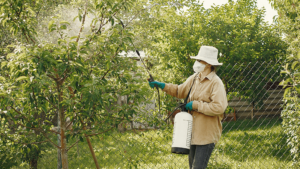
2. Cocoa mulch – Made of discarded cocoa bean shells, cocoa mulch has a tempting chocolate-like smell that can attract dogs. Because the discarded shells are the byproducts of chocolate production, they can contain theobromine and caffeine, the two ingredients in chocolate that are harmful to dogs. If your dog consumes a mulch variety with higher levels of the toxins, he could experience diarrhea, vomiting, hyperactivity, an abnormal heart rhythm, seizures, and even death.
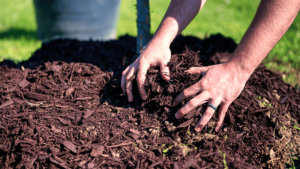
3. Compost – Composting is good for the environment, but not so good for your pet. As the organic matter in compost decomposes, molds will grow, some of which produce tremorgenic mycotoxins. If your pet gets into moldy compost, he might experience panting, agitation, drooling, vomiting, tremors, and seizures.

4. Meal-based fertilizers – Most fertilizers won’t harm your pets, but those containing bone meal, blood meal, or feather meal can be tempting to dogs and can cause problems when ingested. If too much is consumed, a concentration in the stomach can form, potentially obstructing the gastrointestinal tract and causing pancreatitis.
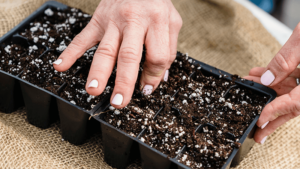
5. Slug and snail baits – Are slugs and snails a problem in your yard? If you have a pet, avoid the use of slug and snail baits that contain metaldehyde, a chemical that is highly poisonous to dogs and cats. If your pet ingests metaldehyde, you’ll notice restlessness, salivation, seizures, tremors, vomiting, and a high fever that can result in death.
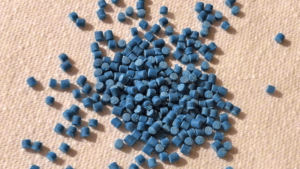
And, of course, some of the most common outdoor toxins for our pets are flowers and plants. Not sure about some of the plants in your yard? Check out this list of toxic and non-toxic plants from the ASPCA.
.
National Animal Poison Prevention Week – Spring Time Poisons
3/18/2024
Spring has sprung in Maryland’s Charm City of Baltimore, bringing with it beautiful blossoms and blue skies. As we embrace the change of season, it’s crucial to ensure the safety of our beloved pets amidst the beauty of nature.
From March 17th to the 23rd, we observe Pet Poison Prevention Week, a reminder to stay vigilant and informed about potential hazards that could jeopardize our furry friends’ well-being.
Here at Abbey Animal Hospital, we’re committed to safeguarding your pet’s health. Throughout this week, we’ll shed light on common springtime poisons lurking in our surroundings. But remember, knowledge is power! For a comprehensive list of dangerous substances, plants, and foods, don’t hesitate to consult resources like the Pet Poison Helpline or ASPCA Poison Control.
Fertilizers
While most are not very toxic (probably just an upset stomach), some fertilizers can be fatal without treatment. Here are a few ingredients to be aware of so you know what toxins and symptoms to watch out for.
- Blood Meal – This is dried, ground and flash-frozen blood and contains 12% nitrogen. While it’s a great organic fertilizer, if ingested, it can cause vomiting and diarrhea. More importantly, it can result in severe pancreatitis.
- Rose & Plan Fertilizers – Some fertilizers contain disulfoton or other organophosphates (OP). As little as 1 teaspoon of 1% disulfoton can kill a 55lb dog!! Organophosphates can cause severe drooling, urination, defecation, seizures, difficulty breathing, hyperthermia and more. It can also be fatal.
- Iron – This is a common additive to fertilizers and can result in iron toxicity. Common symptoms of iron toxicity are vomiting, diarrhea, lethargy, abdominal pain, shock, elevated heart rate, panting, and tremors.
- Pesticides & Insecticides – Some contain organophosphates which as mentioned above can be fatal. Sprays can be an irritant to your pet which can cause symptoms such as drooling, vomiting, and diarrhea.
.
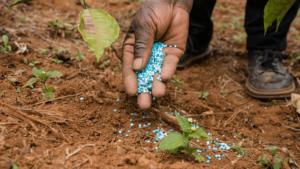
Top 10 Plants Poisonous to Pets
This is only a partial list of poisonous plants. For a more complete list of plants poisonous to cats and dogs, visit Pet Poison Hotline.
.

Household Cleaners
Some cleaning products can cause mild symptoms such as vomiting, diarrhea and skin irritation. There are a few that can cause skin burns/lesions in their mouth, face or body. Keep all cleaning products out of reach of pets and kids.
- Drain cleaner
- Concentrated dishwashing chemicals
- Lime-removal products
- Oven cleaners
- Grill cleaners
- Concentrated toilet cleaners
- Bleach
.
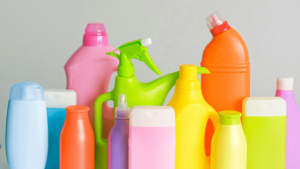
This Spring, we want you and your pets to be safe! If you have ANY questions if something is safe or harmful, do not hesitate to call us at Abbey Animal Hospital, at (410)256-0742, or call the Pet Poison Helpline or ASPCA Poison Control.
.
What inspired Dr. Kuhlman to become a veterinarian?
3/1/2024
 My journey in the veterinary field began at a young age, sparked by my father’s work as a pharmaceutical veterinarian. His stories about interesting animals and helping people fueled my passion for working with animals. As I grew older, this passion only intensified. People often tell me that dogs warm up to me fairly quickly, even the nervous ones. I wanted to pursue a career where I could utilize my skills and do what I love.
My journey in the veterinary field began at a young age, sparked by my father’s work as a pharmaceutical veterinarian. His stories about interesting animals and helping people fueled my passion for working with animals. As I grew older, this passion only intensified. People often tell me that dogs warm up to me fairly quickly, even the nervous ones. I wanted to pursue a career where I could utilize my skills and do what I love.
 Once I decided to become a veterinarian, I embarked on the arduous journey of applying to veterinary schools and gaining valuable experience to become the best candidate possible. To further my humanist goals and strengthen my experience, I joined the Peace Corps and was sent to a small community in Nicaragua. There, I worked to improve the lives of both people and animals. Whether it was administering chicken vaccinations, performing pig castrations, or providing nutritional information to enhance dogs’ diets, my passion for helping others remained steadfast.
Once I decided to become a veterinarian, I embarked on the arduous journey of applying to veterinary schools and gaining valuable experience to become the best candidate possible. To further my humanist goals and strengthen my experience, I joined the Peace Corps and was sent to a small community in Nicaragua. There, I worked to improve the lives of both people and animals. Whether it was administering chicken vaccinations, performing pig castrations, or providing nutritional information to enhance dogs’ diets, my passion for helping others remained steadfast.
That passion continues to drive me today. I am committed to working with you and your pets to improve their overall quality of life. Together, let’s ensure your pets receive the best care possible. Thank you for reading, I hope to work with you and your beloved pets soon.
If you’d like to schedule an appointment with me, please don’t hesitate to reach out. Click here to request an appointment or call (410)256-0742.
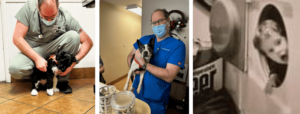
.
Get To Know Dr. Travis Kuhlman!
 2/29/2024
2/29/2024
Hello, everyone! My name is Travis Kuhlman, and I’m thrilled to introduce myself to you all. While you may find a more formal biography on this website, I wanted to share a bit of my personal story with you as well.
A significant part of my life has been shaped by my work in the Peace Corps. For nearly three years, I worked in a small rural community in Nicaragua, primarily in the agricultural sector. My time there was filled with countless stories – from incredible highs to disheartening lows. I formed deep connections with the local community, faced challenges such as scorpion stings (yes, more than once!), and learned valuable lessons about cultural norms. My experience reinforced my empathy and drive to help others, both people and animals alike. And whenever work slows down, you’ll often find me sharing stories (or perhaps, tormenting my colleagues) with tales from Nicaragua.
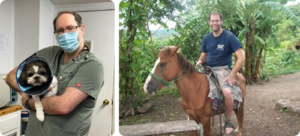 Outside of work, I have a few hobbies that keep me busy. Despite my less-than-stellar culinary skills, I enjoy cooking. I’m also an avid reader, with a particular love for fantasy, horror, and science fiction. Currently, I’m immersed in Terry Pratchett’s Discworld series, just finished re-reading Stephen King’s Dark Tower series and delving into Iain Banks’ Culture series. Additionally, I have a passion for writing. In my younger days, I had some short stories published online, narrated by popular YouTubers, and even had the opportunity to ghost-write for a video game series.
Outside of work, I have a few hobbies that keep me busy. Despite my less-than-stellar culinary skills, I enjoy cooking. I’m also an avid reader, with a particular love for fantasy, horror, and science fiction. Currently, I’m immersed in Terry Pratchett’s Discworld series, just finished re-reading Stephen King’s Dark Tower series and delving into Iain Banks’ Culture series. Additionally, I have a passion for writing. In my younger days, I had some short stories published online, narrated by popular YouTubers, and even had the opportunity to ghost-write for a video game series.
I hope this gives you a better sense of who I am beyond the professional realm. Thank you for taking the time to get to know me a bit better.
If you’d like to schedule an appointment with me, please don’t hesitate to reach out. I’d love the opportunity to meet you and your furry loved ones. Click here to request an appointment or call (410)256-0742.
.
The Importance of Dental Care for Our Furry Friends
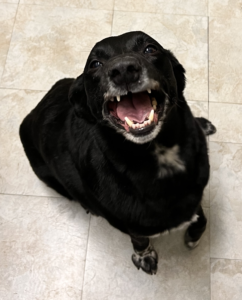
2/11/2024
Dear Abbey Animal Hospital Family,
February is National Pet Dental Health Month, a reminder to take a look at (and smell) your dog or cat’s mouth. Dental care and cleaning are crucial for the overall health of dogs and cats. It is just as important for them as it is for us.
Plaque and tartar buildup cause more than just bad breath; it can lead to painful, inflamed gums (gingivitis), infected teeth, tooth loss, abscesses, and even jaw fractures. Dental disease also isn’t confined to the mouth. Bacteria from dental infections can pass into the bloodstream and cause inflammation and damage to organs like the kidneys and the heart.
So, what can you do to prevent severe dental disease in your furry family members?
The most important thing is routine at-home care, such as brushing, using Perio Support powder, and offering dental treats. This will slow the progressive buildup of plaque, but just as with humans, professional cleaning is needed.
That’s where your vet comes in. Much like your dental hygienist visit, we scale the tartar off the teeth and from under the gum line, polish with fluoride, as well as identify and address issues such as dental damage and loose or infected teeth.
By working together on dental health for pets, we can enhance their quality of life and minimize the risk of more serious diseases down the road. Don’t delay, request your appointment here and let the Abbey Animal Hospital dental team keep your pet smiling.
Take care,
Dr. Jay and the staff of Abbey Animal Hospital
For a limited time: Come in for your dental estimate now and get 10% off when you schedule your pet’s cleaning within 30 days of your estimate. Call (443)256-0742 now.
Canine Infectious Respiratory Disease (CIRD) Update

12/11/2023
Dear Abbey Animal Hospital Family,
We have been fielding a lot of calls with questions about the mysterious (atypical) canine infectious respiratory disease (CIRD) that has been spreading across the United States. Some features of this disease include:
- Respiratory infections/coughing that can last for 6 – 8 weeks and have minimal or no response to antibiotics.
- Pneumonia that has minimal or no response to antibiotics.
- Sudden pneumonia that can result in hospitalization and death within 24 – 36 hours.
Information about this disease process is evolving, and we are keeping an eye on it. No specific infective agent has been identified yet, and it is unknown whether the cause of the disease is a completely new virus or bacteria, a new strain of an existing virus or bacteria (such as Bordetella, K9 Flu, Adenovirus, or Parainfluenza), or a surge of these existing infections due to fewer social interactions of dogs during the COVID years.
Current recommendations are to ensure preventative treatments and vaccinations are up to date, and practice “dog social distancing” – avoid taking your dog to dog parks, doggy daycare, kennels, and pet stores. If grooming appointments can be delayed without resulting in health problems such as matting, fecal soiling in the hair, and skin infections, that should be done.
At our hospital, we recommend that for dog appointments you stay in your car until it is time for us to bring you in. If it has been more than 6 months since your dog had a Bordetella and K9 Flu booster, and more than 2 years since the last distemper-parvo vaccine (3DAP/DHPP), we would recommend calling for a tech appointment to update them early. If you have not previously had your dog(s) vaccinated for Bordetella and K9 Flu, please consider calling to get them done.
We will post updates on this issue as more information comes to light. In the meantime, additional information can be found on the website of the Maryland Veterinary Medical Association: https://www.mdvma.org/canine-respiratory-illness-2023
Take care and stay safe,
Dr. Jay and the staff of Abbey Animal Hospital
Important Patient Information & FAQs
Request an Appointment
How can I request an appointment?
We’re here to help. Click here to visit our patient portal to request an appointment. We’ll call you back as soon as we’re able to schedule your appointment. Or you can call our friendly reception team at (410) 256-0742.
New Patients
How do I make an appointment if I haven’t been to Abbey Animal Hospital before?
First of all, welcome! We can’t wait to meet you and your beloved pet/s. Click here to fill out our new patient form.
Request a Prescription Refill
How do I request a refill of my pet’s prescription?
You can click here to request a refill of your pet’s medication. If you need to bring your four-legged friend in for any reason before a refill request is approved, we will call you. If you have any questions, you can also call us at (410)256-0742.
Emergencies
What should I do if Abbey Animal Hospital isn’t open and I believe my pet’s life is in danger?
If Abbey Animal Hospital isn’t open and you believe your pet is experiencing a life-threatening emergency, seeking immediate veterinary attention is crucial.
In an emergency, please call:
Animal Emergency Hospital
(410)420-7297
722 Baltimore Pike, Bel Air, MD 21014
or
Urgent VET Care
(443) 318-6500
11121 York Road, Cockeysville, MD 21030
Cancellations
What should I do if I need to cancel or reschedule my appointment?
Please let us know at (410)256-0742 as soon as possible.
Please be aware that repeated cancellations may result in us having to secure future appointments with a non-refundable deposit.
CareCredit Insurance
Yes, we accept CareCredit, a health and wellness credit card with flexible financing options so you can pay over time for care you want or need for your pet’s continued care. You can click here to find out more.

